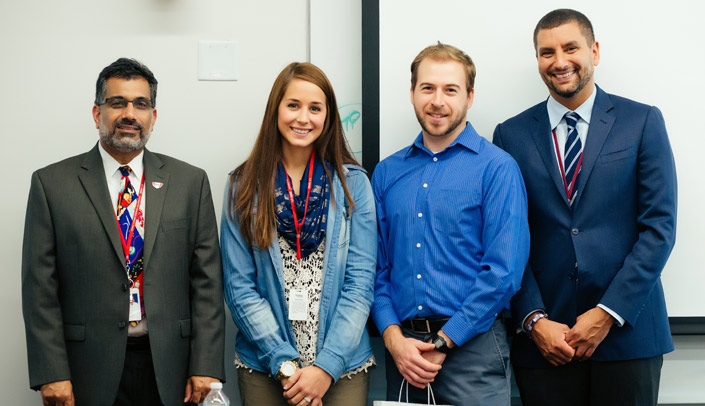Nearly 100 faculty and undergraduate students representing UNMC’s three rural health education pipeline programs were on campus Monday for an annual visit and tour.
Every fall, students from Chadron, Peru, and Wayne State Colleges, and the University of Nebraska at Kearney (UNK), visit to learn about careers in health care. They are active in the Rural Health Opportunities Program (RHOP), Kearney Health Opportunities Program (KHOP) and Public Health Early Admissions Student Track (PHEAST).
About RHOP
The Rural Health Opportunities Program (RHOP) began in 1990 to encourage rural residents to pursue careers in health care and practice in small communities throughout Nebraska. Once accepted into RHOP, students obtain early admission into one of nine health professions at UNMC upon completion of their studies at Chadron State College or Wayne State College. More than 60 percent of RHOP graduates go on to practice in rural communities.
Two new programs were developed out of RHOP’s success — PHEAST, which targets undergraduates interested in public health careers, began in 2011, and KHOP, which targets high school seniors interested in family medicine, began in 2010.
Students learned about different health care professions, how to succeed at UNMC, and options in housing and financial aid. Faculty from Chadron and Wayne State Colleges received an overview of public health programs, expectations, careers and additional information that will help them provide better academic advice to students.
This year, Shelby Watson, 23, became the first PHEAST student to enter UNMC after graduating from UNK in exercise science. She began the health services research and administration tract this fall.
“As a sophomore, I didn’t know where I was going with my degree,” she said. “I found my passion when I heard about the PHEAST program.”
The Beatrice native had been active in sports through Tri-County High School, in volleyball, track, basketball and softball. But she began to have “episodes” — word slurring, eyes rolling back into her head, body shaking episodes — that started during her freshman year in high school and gradually got worse.
It took six years for her to be diagnosed with adrenaline-induced diabetes. She had to change her diet and exercise routine. Now she eats whole wheat bread and more fruits and vegetables.
“As soon as I saw how critical these food choices were to my health, I decided to take what I learned to help others make better nutritional choices,” Watson said.
Every PHEAST student has a mentor to provide insight into the field of public health and Derry Stover, occupational safety and health epidemiologist, Nebraska Department of Health and Human Services, was Watson’s.
“Derry was helpful in my transition from undergraduate to professional school. He answered my questions and provided guidance along the way. He has become a great resource and friend.”
Watson dove into UNMC life and quickly secured an internship with Building Healthy Futures, a school-based program that provides health care to underserved people in the Omaha Public School system.
“Public health involves a lot of preventative measures, but it also lets me help people regain their health.”
